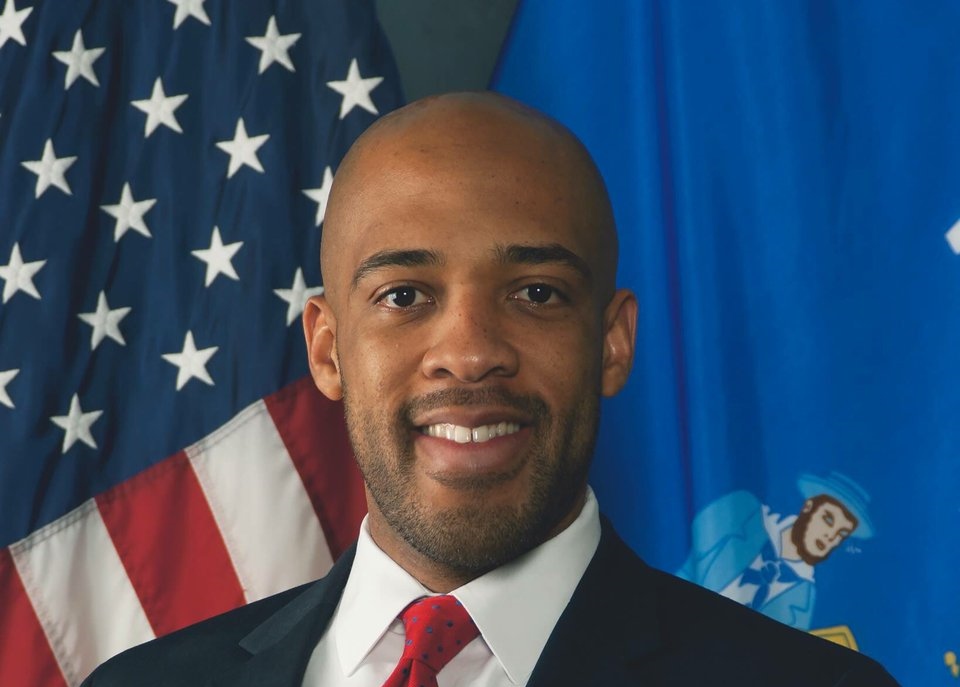Barnes Campaign Aims to Bring State Together
Lt. Governor and U.S. Senate candidate running hard in rural, urban areas of state.
In the rolling farmland of Green County in south-central Wisconsin, about 40 minutes northwest of Beloit, a caravan of cars pulls into the muddy yard at the Riemer Family Farm. Cows watch from a nearby field as Jen and Bryce Riemer come out onto their front porch to welcome Lt. Governor Mandela Barnes, the leading candidate in a field of Democrats hoping to challenge Republican Sen. Ron Johnson in the fall. Barnes is flanked by a couple of campaign staffers and state Rep. Mark Spreitzer (D-Beloit), a friend from his days in the Assembly who represents this area. A group of organic farmers from five local farms, friends of the Riemers, troop across the porch and into the gracious old farmhouse to sit at a long dining room table. Barnes takes a seat in the middle on one side, under a heavy pendulum clock.
With five months to go before the Aug. 9 primary, Barnes is running hard, maintaining a heavy travel schedule to every corner of the state. He has seen his lead slip a tad in the latest polls and has had to answer calls that he’s flip flopped on issues dear to progressives. He’s here today to sell himself to a friendly rural audience as he hones a message about bringing together urban and rural voters around their common interests in a deeply divided state.
Connecting the decline of manufacturing in Wisconsin to the decline of family farms, Barnes says, “We have to fight hard to protect our way of life.” He thanks the farmers “for showing up to talk about how we can achieve this together.”
Barnes has been taking the same message all over Wisconsin, telling people, “We have more in common with each other than we do with Ron Johnson.”
It’s a hopeful refrain in a deeply divided state, where former Gov. Scott Walker pioneered the “divide and conquer” politics that metastasized in 2016 when Wisconsin helped elect Donald Trump to the presidency. Partisanship and discord are still raging, as Republicans block Democratic Gov. Tony Evers on everything from his public health orders during the pandemic to school funding.
Barnes, who, with Evers, beat Walker and Republican Lt. Gov. Rebecca Kleefisch by the narrowest of margins in 2018, is focusing on bringing people together again.
Emphasizing his middle-class background, he is running in the primary as the candidate who can best relate to ordinary Wisconsinites, distinguishing himself from Johnson, a millionaire who argued during the pandemic that extending unemployment benefits made people too lazy to work. He is also setting himself apart from his wealthy, self-financing opponents, Milwaukee Bucks CEO Alex Lasry and State Treasurer Sarah Godlewski.
With the best statewide name recognition at the start of the race, Barnes has maintained the highest poll numbers in the Democratic field and has earned high-profile endorsements from U.S. Sens. Elizabeth Warren of Massachusetts and Cory Booker of New Jersey. The March 2 Marquette University Law School poll showed Barnes as the choice of 23% of Democratic primary voters, compared with 13% for Lasry, 5% for Outagamie County Executive Tom Nelson, and 3% for Godlewski. The poll, which also showed that a majority of voters are still undecided, represented a surge for Lasry; his campaign celebrated coming within 10 points of Barnes.
Barnes has likewise maintained his early lead in the fundraising race, raking in $1.2 million in contributions from individual donors between Oct. 1 and Dec. 31. Lasry raised $473,000 from individual donors during that period, while Godlewski raised $364,000 and Nelson raised $216,000. Lasry and Godlewski have padded their campaign coffers with sizable personal loans. And recently both Lasry and Godlewski have made significant TV ad buys that could boost their poll numbers.
Bipartisan successes on water, taxes
Rep. Kristina Shelton (D-Green Bay), who recently endorsed Barnes, praises him for his tireless campaigning, “meeting people where they are, instead of waiting for them to come to him.” She says it was “incredibly inspiring” to watch Barnes chair the Governor’s Task Force on Climate Change, meeting with farmers, business owners and community groups around the state and drawing connections between economic and racial disparities and climate resiliency. She says he “set the table” for the Forward on Climate package of bills Democrats put together during the last legislative session. Those bills went nowhere before Republicans ended the session. But Shelton believes they can be a template for future progress.
“We were mostly just trying to stop things,” acknowledges Spreitzer. “We were on the floor together in the middle of the night trying to stop right to work, trying to stop budget cuts.”
But in the last few years, as lieutenant governor, Barnes helped shape policy on water quality and small business loans, Spreitzer says. “We were able to get some things done,” he allows. Although Republicans blocked new rules to address PFAS contamination in drinking water — a growing problem in the state — a more modest, bipartisan bill passed that will improve drinking water and groundwater. The bill creates a pilot program to help farmers reduce nitrogen loading and leaching, encourages cover crops to improve soil health, and creates a new state hydrogeologist position to help local governments deal with contamination hotspots.
Another bipartisan bill signed by Evers that Barnes championed provides a tax exemption for federal COVID-19 relief grants through the Restaurant Revitalization Fund — so businesses don’t have to pay taxes on pandemic relief loans they received through the Paycheck Protection Program.
“Having Mandela as lieutenant governor helps set a tone on those issues,” Spreitzer says.
Energized by agriculture policy
Barnes appears as energized talking agriculture policy with the farmers at Riemer Family Farm as he was meeting with children at the Beloit Fresh Start program earlier in the day.
The farmers introduce themselves and talk about their struggles to survive in a state that has the worst rate of farm bankruptcies in the nation, as consolidation and bigger and bigger farms push out smaller, family-run operations. Jen Riemer talks about fighting a long, losing battle to try to keep a giant, 6,000-cow dairy farm from getting permission to locate in the area, bringing with it massive pools of manure that threaten the local water supply.
“The fight was framed as ‘environmentalists versus farmers,’” she tells Barnes. “I’m a farmer, but I also drink water.”
Other farmers agree about the existential threats to rural places — threats tied to corporate consolidation and lack of care for the environment. Barnes listens intently, nodding.
Dela Ends, who, with her husband Tony, runs Scotch Hill Farm, describes the angst of rural Wisconsinites. “We really are suffering. We are losing so many small businesses,” she says. The couple supplements their income from selling organic herbs, vegetables and flowers with an agri-tourism business, offering farm stays at their inn. Other farmers around the table have also turned to farm tours to make a living, charging urbanites for a peek at the fast-disappearing small family farm in Wisconsin.
“Things are really accelerating,” Jen Riemer says of the get-big-or-get-out trend. “We’ve got to find real, larger scale solutions.” The Riemers raise grass-fed beef, lamb and organic pork. Consumers who buy veggie burgers don’t understand that they are contributing to environmental problems created by vast monoculture soy crops that deplete the soil and require heavy chemical inputs, she tells Barnes. “I feel like the veggie burger, the impossible meat garbage, has this strong lobby,” she says.
“Yeah, I’m definitely with you on the meatless patties,” says Barnes, getting a laugh. Later Spreitzer says he and Barnes used to get their organic produce from the same farm. “He walks the walk,” Spreitzer says.
As for what he can do about the accelerating tragedy of family farming in Wisconsin, the farmers seem satisfied that Barnes mostly just listened.
“He’s a good listener,” says Dan Wegmueller of the Wegmueller dairy. “He didn’t give me one single reason not to vote for him.”
In the general election, however, “He’s got to appeal to the majority of farmers who are not like us,” says Dela Ends. “We’re already in his court.”
As Barnes is leaving, Bryce offers to set up another meeting later on with some conventional farmers in the area.
After the meeting, Ends expands on the overwhelming feeling of alienation in rural areas.
“We kind of feel defeated at this point,” she says. “If you knew how many people in rural communities have cancer because we drink crappy water and breathe crappy air … or the chemical spray drift from big farms that ruins organic crops.”
She likes Barnes’ focus on environmental issues, which she feels ought to bring people together.
“Conventional farmers are in a trap,” she adds, “they are dependent on the subsidies to grow corn and soy, and they’ve been told to get bigger and bigger.”
Still, she thinks it will be a struggle for Barnes to reach rural Republicans and overcome political divisions.
“Conversations like this one help. But there’s hostility, there’s discouragement. Our town of Brodhead hasn’t grown in 100 years. People feel beaten down and like everything goes to the cities and nothing goes to them,” she adds. “It’s complicated.”
The Obama appeal
Barnes is Wisconsin’s first Black lieutenant governor, and only the second Black person to hold statewide office in Wisconsin, a state that is notoriously unwelcoming for Black people. He often speaks about being raised by a public school teacher and a factory worker in the 53206 ZIP code in Milwaukee, one of the nation’s most incarcerated and impoverished areas. His work as a community organizer with the Milwaukee Inner City Congregations Allied for Hope propelled him to run for office for the first time at the age of 25 on a social justice platform. But his warmth and good humor, and his talent for connecting with all kinds of people appeals to voters across lines of race, class and geography.
During the 2018 campaign, Evers and Barnes developed a friendly, easygoing rapport, with Evers acknowledging the energy and charisma his more youthful running mate brought to the ticket.
“In terms of what he brings to a midterm election – his ability to get people excited and off the sidelines, who wouldn’t otherwise vote, is really important,” says John Drew, vice president of UAW Local 72 and a longtime friend of Barnes’ father who has supported Barnes throughout his political career. “The electability question is about not just bridging the divide but about bringing people out, getting them excited to vote for someone they like.”
“There’s a different generation of young people who are voters now,” says Lauren Baker, who knows Barnes’ mother from working with her in the Milwaukee teacher’s union, and has also watched Barnes throughout his career. “I saw that in our school board elections in Milwaukee — a new group of voters coming out. He is very interesting to them.”
A polished looking video titled “Change the Game” introduces Barnes on his campaign Facebook page, showing him rising at dawn and lacing up his shoes for an early morning run. “Excuses are nothing but a dead end. And expectations … are something to be shattered,” he says in a voice-over. Scrolling text highlights his precocious achievements — starting high school at age 12 and going to college at age 16, becoming a state legislator at age 25 and lieutenant governor at 31 — over scenes of Barnes meeting with people of all different races, ages, and genders. The camera shows him in church, gazing up at an American flag and watching a Little League game. “We can’t settle for what is. We have to reach for what can be,” he says. Energy, hope, change, bringing people together — the emotional tenor is, not coincidentally, reminiscent of another rising star from the Midwest, an appealingly relatable Black candidate whose career took him from the state legislature to the U.S. Senate and on to the White House.
It’s a credible pitch. Wisconsin voters in 23 counties who helped elect Trump also voted Barack Obama into the presidency twice.
The question raised by the Barnes campaign is whether Wisconsinites can ever feel that hopeful again.
At a rally outside Oshkosh Defense, after the company announced it would be outsourcing 1,000 good-paying jobs making the next generation of mail trucks for the U.S. Postal Service to a nonunion plant in South Carolina, Barnes told the crowd, “You need to send the son of a union family to fight for the middle class in Washington.” He linked the Oshkosh battle to the fights on right-to-work and prevailing wage. And he closed his speech by shouting “Solidarity!”
“It’s personal for me,” Barnes tells the Examiner, referring to Oshkosh Corp.’s decision to outsource those jobs, and Johnson’s headline-making response that he wouldn’t fight to keep the jobs in his hometown, because, “It’s not like we don’t have enough jobs here in Wisconsin.”
“I know it’s personal for every union worker in Wisconsin,” Barnes adds. The UAW plant where Barnes’ father worked third shift for 30 years is gone, now a strip mall with minimum wage jobs The same is true in too many communities where good manufacturing jobs have fled, he says.
On March 23, Barnes released a plan to revitalize Wisconsin manufacturing, strengthen unions, and invest in communities that have lost manufacturing jobs. Titled the “Make it here agenda,” the plan aims to make Wisconsin a leader in sustainable manufacturing through the production of electric vehicles, solar panels, and windmills, and to “grow a stronger middle class by supporting labor unions.”
But as union membership has declined sharply in Wisconsin over the last decade, a lot of working people don’t feel that unions are their voice anymore. White working class voters who have fallen out of the middle class have turned to identity politics, rallying to Republican resistance to public health orders during the pandemic and attacks on so-called Critical Race Theory. But Barnes perceives rising support for labor rights and, like other Democrats including Evers and Biden, is more outspoken on the issue than Democrats of the 1990s and early 2000s, including Obama.
He points to recent organizing drives at Starbucks, Amazon, and other big companies around the country. “People are dissatisfied,” Barnes says. “And it’s why you see a lot of people leaving the workforce. They don’t feel valued. They don’t feel respected. They don’t feel compensated for the work that they do.”
Traveling the state over the past two years, dispensing federal pandemic relief to farmers and small business owners, Barnes says he has seen a need that transcends political parties. “Only needing one job to make rent or put food on the table, not having to think twice before you take a sick kid to the emergency room, or sending your children to world class schools — these aren’t about red, blue or Black or white,” Barnes tells the Examiner. “It’s about who’s been on top and who’s been left at the bottom. It’s about Ron Johnson, who he has delivered for and who he has left in the dust during his time in the Senate.”
Abandoning his progressive roots?
Barnes’ sharpest critic during the current campaign has been his Democratic rival Tom Nelson, who says Barnes has abandoned his former progressive policy positions on issues ranging from Defund the Police to Abolish ICE to the Green New Deal and Medicare for All.
“He’s inconsistent, he’s changing his positions,” Nelson said in an interview with the Milwaukee Journal Sentinel. “Voters don’t know where he’s at.”
In an interview on “The Young Turks,” Nelson said that as lieutenant governor Barnes “has been talking about how Medicare for All is important, the Green New Deal is important, now you can’t get him to say those words.”
“He seemed like he was for defunding the police and now he says he’s not for defunding the police. He wanted to abolish ICE, now he doesn’t want to. I think he’s confused. I think he’s entirely confused,” Nelson added.
Bice also reported that several groups that support defunding the police have endorsed Barnes, and quoted an interview in which Barnes supported funding community services by cutting “over-bloated budgets in police departments.” Bice contrasted that quote with Barnes’ statement to the Wall Street Journal that “I don’t support defunding the police” to show Barnes “back[ing] away from two unpopular far-left causes.”
Barnes objects to this characterization of him as a flip-flopper, and says his position on the issues has not changed. “I don’t support defunding the police, and I don’t support abolishing ICE,” he says, “but there is no question that our immigration system is broken. So I do support comprehensive immigration reform from the bottom up.” He held up the Abolish ICE T-shirt, he says, as an expression of solidarity with immigrants who were reacting with horror at the time to scenes of children ripped from their parents at the border.
“I’ll tell you what I do believe,” he says in an interview with the Examiner. “We don’t have to choose between ensuring that our law enforcement officers have the resources they need to keep us safe and investing in communities. We can do both. We can get ahead of the issue and also prevent crime in our community by investing in schools, good paying jobs for every individual to work hard and seek success regardless of their ZIP code.”
The day after Jacob Blake was shot seven times in the back by a police officer in Kenosha, Barnes appeared at a press conference with Evers to comment on the shooting and acknowledge the pain of the Blake family and the community in Kenosha. Barnes connected the incident to “systemic violence” that includes not just a police officer shooting a Black man in front of his children, “but when schools that serve the same children are systematically underfunded, or when we see Black women have to fight to be heard in our health care system, or when Black communities are expected to live … with environmental hazards and toxins and contaminants.”
As for whether he is a reliable champion for progressive policy positions, Wisconsin’s top advocates for Medicare for All and the Green New Deal see Barnes as a good bet.
The incremental approach to reaching Medicare for All, which Barnes has endorsed, is more realistic than an all-or-nothing approach, says Robert Kraig, executive director of Citizen Action Wisconsin.
“There’s an important difference between saying, ‘This is all we need,’ which is what Obama said about the ACA, versus [Sen.] Tammy [Baldwin], who embraces advances while saying they are not a stopping point but stepping stones,” Kraig says.
Citizen Action has not yet endorsed a candidate in the Senate race. But Kraig says he is very comfortable with Barnes as an advocate for Medicare for All. “We need more pragmatic radicalism,” he says.
Citizen Action is also interested in climate reform and economic justice, and has backed the ambitious federal Thrive Act introduced by Sen. Ed Markey (D-Mass), which would invest $10 trillion in transitioning the U.S. to green infrastructure and tackle economic and racial inequality as well as climate change. As a litmus test, Kraig was glad to hear that Barnes supports the bill. (“I do support the Thrive Act,” Barnes confirmed to the Examiner.)
Joel Rogers, the University of Wisconsin professor and MacArthur genius whose work on building a “high road economy” helped inform the concept of the Green New Deal, has endorsed Barnes and believes he could get a lot done during what could be a decades-long career in the U.S. Senate.
Over the next 30 years, “we’re either going to be more or less extinct as an evenly passably civilized species, or we’re going to be in the process of saving our ass from ourselves,” Rogers says. “And I can’t imagine someone more forcefully articulating the need to do the latter and do it with equity.”
Rogers doesn’t buy the criticism that Barnes has abandoned his progressive roots. “He certainly has talked about universal access to affordable quality health care and campaign finance and other pro-democracy reforms very consistently for a very long time,” he says.
Plus, Rogers adds, “I want to revive the non-vital center right now in American politics and make it a little bit more vital. So if anybody accuses him of centrism, I think that’s good. I mean, this is Wisconsin. It’s a battleground.”
The optimist: Mandela Barnes’ Senate campaign aims to bring Wisconsin back together was originally published by the Wisconsin Examiner.




















